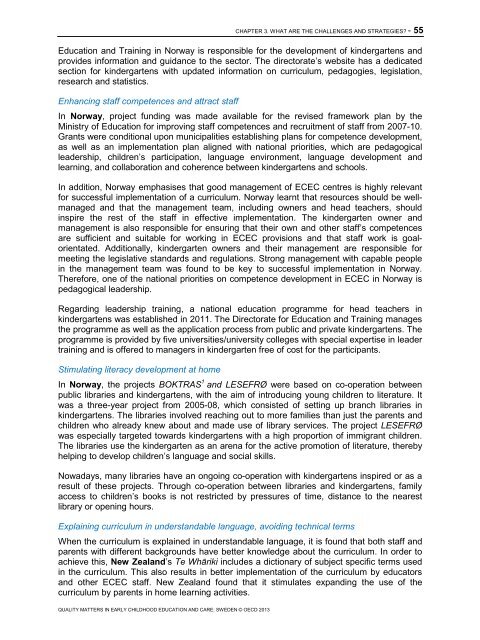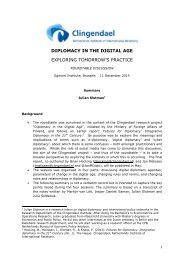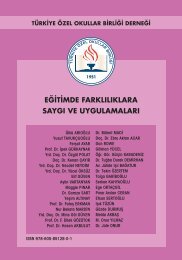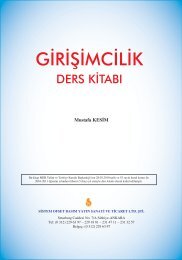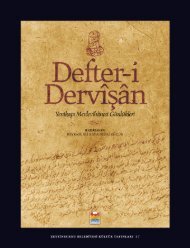SWEDEN%20policy%20profile%20-%20published%2005-02-2013
SWEDEN%20policy%20profile%20-%20published%2005-02-2013
SWEDEN%20policy%20profile%20-%20published%2005-02-2013
Create successful ePaper yourself
Turn your PDF publications into a flip-book with our unique Google optimized e-Paper software.
QUALITY MATTERS IN EARLY CHILDHOOD EDUCATION AND CARE: SWEDEN © OECD <strong>2013</strong><br />
CHAPTER 3. WHAT ARE THE CHALLENGES AND STRATEGIES? - 55<br />
Education and Training in Norway is responsible for the development of kindergartens and<br />
provides information and guidance to the sector. The directorate’s website has a dedicated<br />
section for kindergartens with updated information on curriculum, pedagogies, legislation,<br />
research and statistics.<br />
Enhancing staff competences and attract staff<br />
In Norway, project funding was made available for the revised framework plan by the<br />
Ministry of Education for improving staff competences and recruitment of staff from 2007-10.<br />
Grants were conditional upon municipalities establishing plans for competence development,<br />
as well as an implementation plan aligned with national priorities, which are pedagogical<br />
leadership, children’s participation, language environment, language development and<br />
learning, and collaboration and coherence between kindergartens and schools.<br />
In addition, Norway emphasises that good management of ECEC centres is highly relevant<br />
for successful implementation of a curriculum. Norway learnt that resources should be wellmanaged<br />
and that the management team, including owners and head teachers, should<br />
inspire the rest of the staff in effective implementation. The kindergarten owner and<br />
management is also responsible for ensuring that their own and other staff’s competences<br />
are sufficient and suitable for working in ECEC provisions and that staff work is goalorientated.<br />
Additionally, kindergarten owners and their management are responsible for<br />
meeting the legislative standards and regulations. Strong management with capable people<br />
in the management team was found to be key to successful implementation in Norway.<br />
Therefore, one of the national priorities on competence development in ECEC in Norway is<br />
pedagogical leadership.<br />
Regarding leadership training, a national education programme for head teachers in<br />
kindergartens was established in 2011. The Directorate for Education and Training manages<br />
the programme as well as the application process from public and private kindergartens. The<br />
programme is provided by five universities/university colleges with special expertise in leader<br />
training and is offered to managers in kindergarten free of cost for the participants.<br />
Stimulating literacy development at home<br />
In Norway, the projects BOKTRAS 1 and LESEFRØ were based on co-operation between<br />
public libraries and kindergartens, with the aim of introducing young children to literature. It<br />
was a three-year project from 2005-08, which consisted of setting up branch libraries in<br />
kindergartens. The libraries involved reaching out to more families than just the parents and<br />
children who already knew about and made use of library services. The project LESEFRØ<br />
was especially targeted towards kindergartens with a high proportion of immigrant children.<br />
The libraries use the kindergarten as an arena for the active promotion of literature, thereby<br />
helping to develop children’s language and social skills.<br />
Nowadays, many libraries have an ongoing co-operation with kindergartens inspired or as a<br />
result of these projects. Through co-operation between libraries and kindergartens, family<br />
access to children’s books is not restricted by pressures of time, distance to the nearest<br />
library or opening hours.<br />
Explaining curriculum in understandable language, avoiding technical terms<br />
When the curriculum is explained in understandable language, it is found that both staff and<br />
parents with different backgrounds have better knowledge about the curriculum. In order to<br />
achieve this, New Zealand’s Te Whāriki includes a dictionary of subject specific terms used<br />
in the curriculum. This also results in better implementation of the curriculum by educators<br />
and other ECEC staff. New Zealand found that it stimulates expanding the use of the<br />
curriculum by parents in home learning activities.


